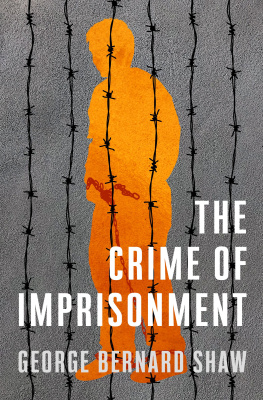Pagebreaks of the print version


The Crime of Imprisonment
George Bernard Shaw
Foreword
When I was a boy in my teens in Dublin I was asked by an acquaintance of mine who was clerk to a Crown Solicitor, and had business in prisons, whether I would like to go through Mountjoy Prison, much as he might have asked me whether I would like to go through the Mint, or the cellars at the docks. I accepted the invitation. What struck me most was that the place was as bright and clean as whitewash and scrubbing and polish could make it, with all the warders looking thoroughly respectable, and all the prisoners ruffianly and degenerate, except one tall delicate figure tramping round in the exercise ring, a Lifer by the color of his cap, who had chopped up his family with a hatchet, and been recommended to mercy on account of his youth. I thought, and still think, imprisonment for life a curious sort of mercy. My main impression of the others, and the one that has stuck longest and hardest, was that as it was evidently impossible to reform such men, it was useless to torture them, and dangerous to release them.
I have never been imprisoned myself; but in my first years as a public speaker I had to volunteer for prison martyrdom in two Free Speech conflicts with the police. As my luck would have it, on the first occasion the police capitulated on the eve of the day on which I had undertaken to address a prohibited meeting and refuse to pay a fine; and on the second a rival political organization put up a rival martyr, and, on a division, carried his election over my head, to my great relief. These incidents are not very impressive now; but the fact that my acquaintance with the subject of the following essay began with the sight of an actual prison, and that twice afterwards I was for a week or so firmly convinced that I was about to spend at least a fortnight and possibly a month in the cells, gave me an interest in the subject less perfunctory that that of the ordinary citizen to whom prison is only a reference in the police news, denoting simply a place where dishonest and violent people are very properly locked up.
This comfortable ignorance, by the way, is quite commonly shared by judges. A Lord Chief Justice of England, grieved at hearing from a lady of social importance that her son had been sent to prison as a Conscientious Objector, told her that he hoped she would get to see him often, and keep up his spirits with frequent letters, and send him in nice things to eat. He was amazed to learn from her that he might just as well have suggested a motor ride every afternoon and a visit to the opera in the evening. He had been sentencing people all through his judicial career to terms of imprisonment, some of them for life, without knowing that it meant anything more than being confined to the house and wearing a dress with broad arrows all over it. No doubt he thought, quite rightly, that such confinement was bad enough for anybody, however wicked.
I had no such illusions about prison life. My political activities often brought me into contact with men of high character and ability who had been victims of modern forms of persecution under the very elastic heading of treason, sedition, obstruction, blasphemy, offences against press laws, and so forth. I knew that Karl Marx had declared that British prisons were the cruelest in the world; and I thought it quite probable that he was right. I knew Prince Peter Kropotkin, who, after personal experience of the most villainous convict prisons in Siberia and the best model prison in France, said that they were both so bad that the difference was not worth talking about. What with European politicals and amnestied Irish Fenians, those who, like myself, were in the way of meeting such people could hardly feel easy in their consciences about the established methods of handling criminals.
Also I was in occasional touch with certain efforts made by the now extinct Humanitarian League, and by a little Society called the Police and Public Vigilance Society, to call attention to the grievances of prisoners. The League dealt with punishments; the Society, which was really an agitation conducted by one devoted man with very slender means, the late James Timewell, tried to obtain redress for people who alleged that they had been the victims of petty frame-ups by the police. But the witnesses on whose testimony these two bodies had to proceed were mostly either helpless creatures who could not tell the truth or scoundrels who would not tell it. The helpless creatures told you what they wanted to believe themselves: the scoundrels told you what they wanted you to believe.
Anyone who has tried to find out what war is like from our demobilized soldiers will understand. Their consciousness is limited and utterly uncritical; their memory is inaccurate and confused; their judgment is perverted by personal dislikes and vanities; and as to reflection, reason, self-criticism, and the rest of the intellectual counterchecks, they have no more of them than a mouse has of mathematics. If this is the case with normal men like soldiers, even less is to be expected from subnormal men like criminals. Neither the Humanitarian League nor Mr. Timewell could rouse general public compunction with such testimony, or attract special subscriptions enough to enable them to conduct a serious investigation. And John Galsworthy had not then arisen to smite our conscience with such plays as The Silver Box and Justice.
This situation was changed by the agitation for Votes for Women and the subsequent war of 1914-18, both of which threw into prison an unprecedented number of educated, critical, public spirited, conscientious men and women who under ordinary circumstances would have learnt no more about prisons than larks learn about coal mines. They came out of prison unembittered by their personal sufferings: their grievance was the public grievance of the whole prison system and its intense irreligiousness. In prison they had been capable of observing critically what they saw; and out of prison they were able to describe it. The official whitewash of the Prison Commissioners could not impose on them. They and their friends had money enough to take an office and engage a secretarial staff, besides supplying some voluntary educated labor. They formed a committee with Lord Olivier as chairman, which investigated the condition of English prisons and incidentally read some interesting reports of American ones. Eventually they issued their report as a volume entitled English Prisons Today, edited by Stephen Hobhouse and Fenner Brockway, who had both been in prison during the war.
I was a member of that committee; and the essay which follows was written as a preface to the report. But I did not find it possible to keep a thorough sifting of the subject within the limits of the sixth commandment, on which Mr. Hob house took an uncompromising stand. Fortunately my friends Sidney and Beatrice Webb were just then reinforcing the work of the committee by issuing the volume of their monumental history of English Local Government which deals with prisons. By transferring my preface to their book I was able to secure the intended publicity for it, and to please everybody concerned, myself included.
















